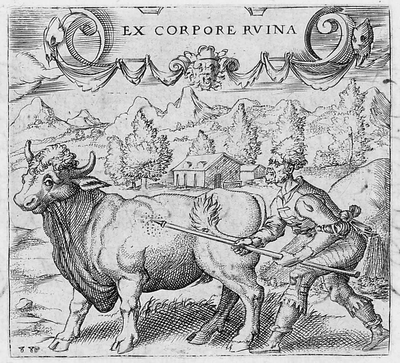Georgette de Montenay/Anna Roemer Visscher, Cent emblemes chrestiens (c. 1615)
Table of contents ↑Ex corpore ruina [88]

Een os die vet is en den vollenhouw ghewent,
Noecht qualijck alsmen hem Door dwang ten arbeijt sendt.
Een mensch die Rijck is en jn Weelde ruijm gheseten
Souw Godt, sijn eeven-mensch, en weldoen, wel vergheten.
Maar Godt die t'al om best, en niet en doet om niet:
Weckt Die vaack op door Ramp, tegenspoet en verdriet.
En dat beweecht haer Dan, tot waaken, bidden Clagen,
T'benaut Hert maeckt de ziel ootmoedich en verslagen.
Noecht qualijck alsmen hem Door dwang ten arbeijt sendt.
Een mensch die Rijck is en jn Weelde ruijm gheseten
Souw Godt, sijn eeven-mensch, en weldoen, wel vergheten.
Maar Godt die t'al om best, en niet en doet om niet:
Weckt Die vaack op door Ramp, tegenspoet en verdriet.
En dat beweecht haer Dan, tot waaken, bidden Clagen,
T'benaut Hert maeckt de ziel ootmoedich en verslagen.

Ce beuf est gras, & pourtant il se fáche
Quand l'aiguillon le pousse à trauailler.
L'homme enrichi à bien faire est si láche
Qu'il ne vaut rien, si Dieu pour l'esveiller
Ne vient à poinct quelque coup luy bailler
De l'aiguillon d'affliction poignante,
Pour l'inciter à prier & veiller,
De láche cœur se part l'ame dolente.
Quand l'aiguillon le pousse à trauailler.
L'homme enrichi à bien faire est si láche
Qu'il ne vaut rien, si Dieu pour l'esveiller
Ne vient à poinct quelque coup luy bailler
De l'aiguillon d'affliction poignante,
Pour l'inciter à prier & veiller,
De láche cœur se part l'ame dolente.


Translations
 |
...
|
 |
...
|
 |
Ruin from the body.
|
